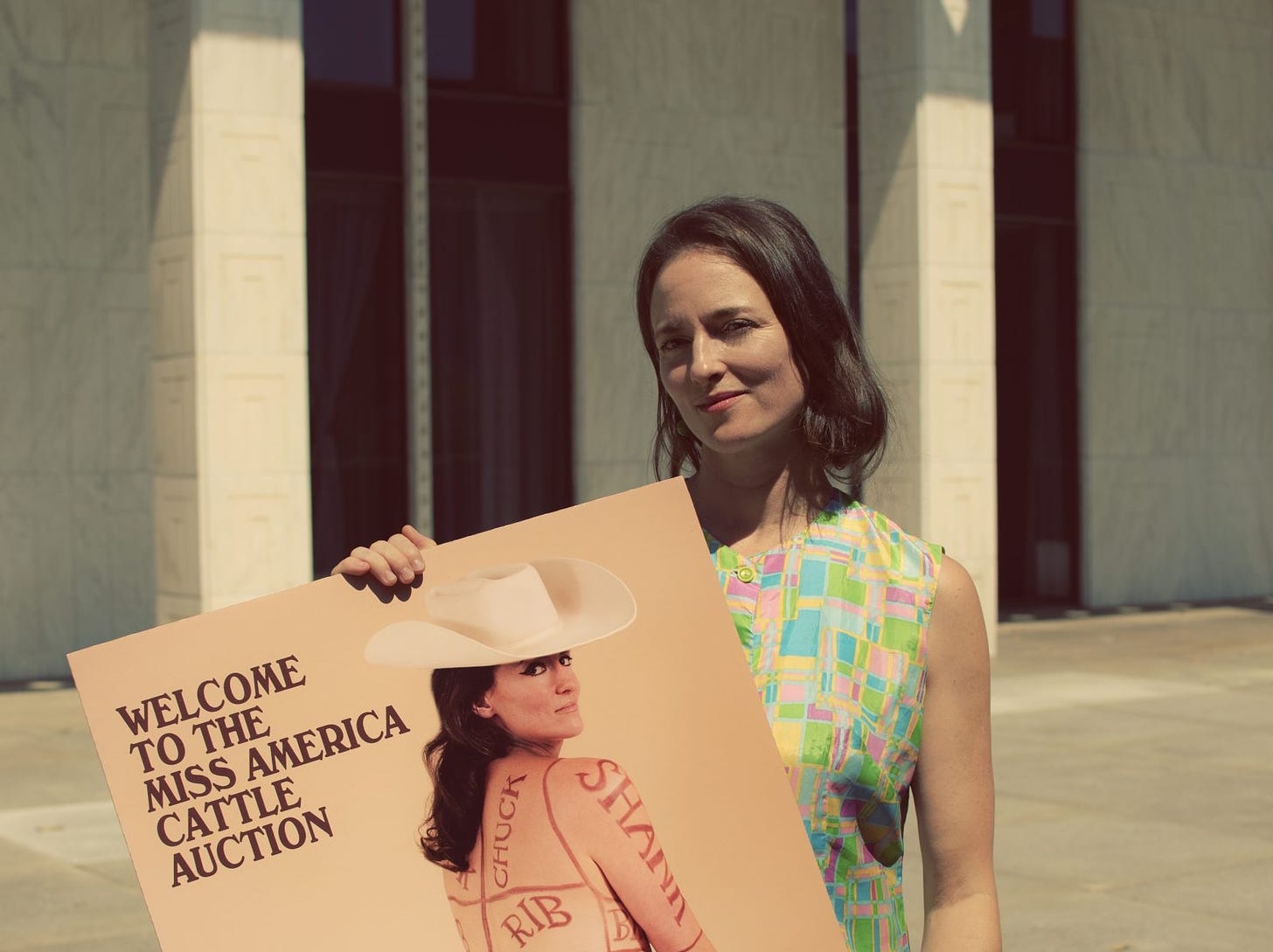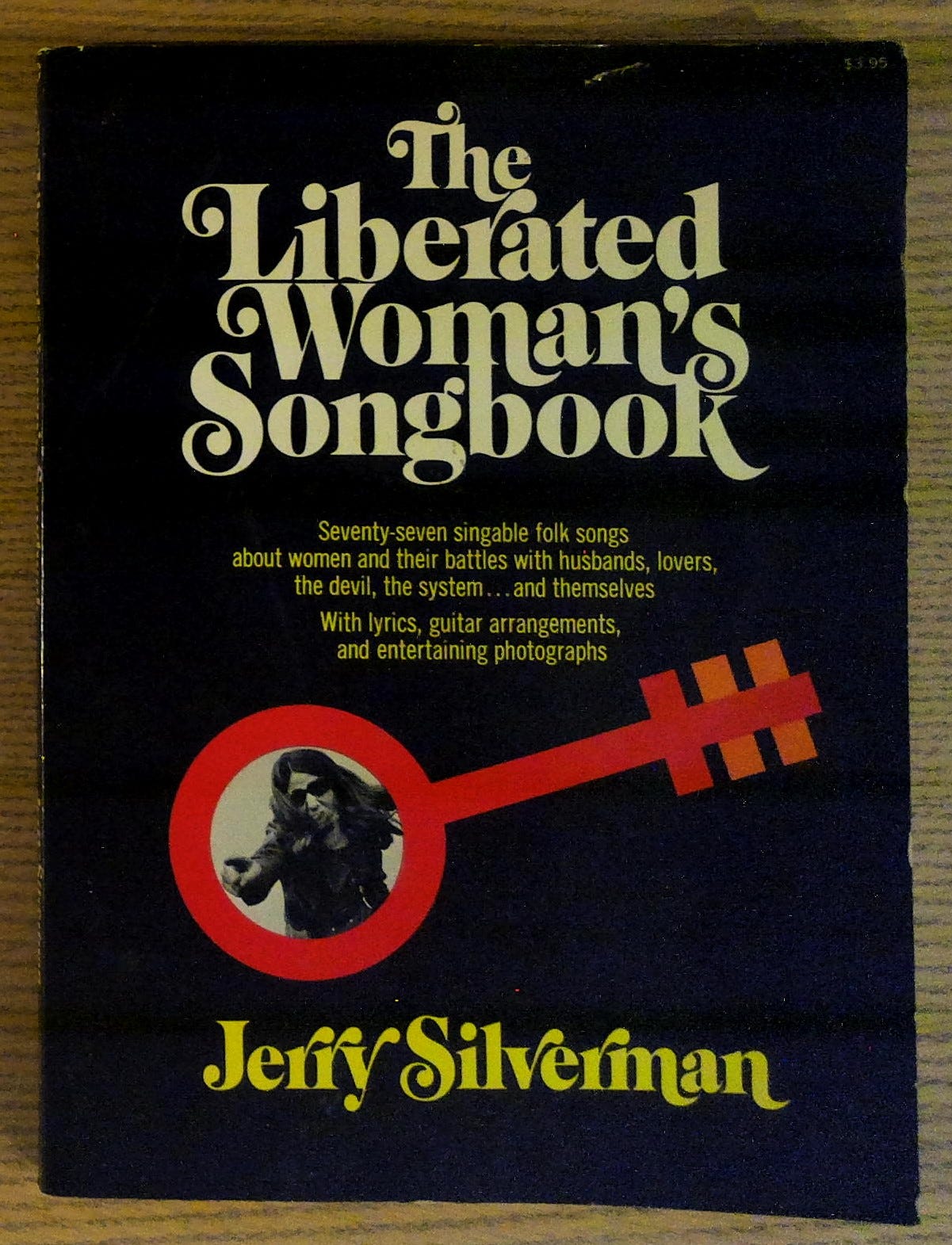Issue #59: Dawn Landes & 'The Liberated Woman's Songbook'
She spoke with DRTI about her spectacular, modern take on over a century's worth of protest music
"In order to know where you are going and how to get there you have to know where you have been and how you got to where you are." So begins the original Liberated Woman's Songbook, published in 1971 by esteemed folk artist, journalist and historian Jerry Silverman — a man, for the record. In spite of that fact, Silverman created a one-of-a-kind record of women's folk songs in a fit of hippie-ish optimism and solidarity, with entries that range from radical (the evergreen "Which Side Are You On?") to familiar ("Greensleeves" is the first entry).
When Dawn Landes, an endlessly creative singer-songwriter as well as producer, engineer and prolific collaborator, came across the songbook in a thrift store, she picked it up without thinking much of it. After the Dobbs decision in 2022 — two years ago this week — Landes found herself drawn to the book and the songs inside. "I kind of made it like my daily ritual, like today I'm going to learn a song from this book," she remembers. "There's some hilarious ones in there, but I tended to hone in on the ones categorized as 'Songs Of The Struggle'."
After learning a bunch of those songs and diving down the protest music rabbithole to source more, Landes decided to record her own interpretations as an album named after that ambitious original project. The wonderful, striking results were released earlier this year after Landes and her producer Josh Kaufman (Bonny Light Horseman, Taylor Swift) shared some of their interpretations at the 2023 Newport Folk Festival. It is a must-listen, with songs spanning over a century that all push with renewed urgency (thanks to Landes) towards a brighter future — guest vocalists include Rissi Palmer and Charly Lowry.
Landes also put together her own Liberated Woman's Songbook, with her updated takes on the songs she chose for the album, and has been performing the music as part of a kind of traveling women's movement variety show that she's put together, inviting new guests at every stop. "I hope you take these songs and help them fly…Sing them! Play them!" Landes writes in the introduction to the songbook. "Help to spread their message of freedom and equity and hope."
Listening to the album, the way you managed to make it feel very modern, but also to still center the lyrics is very special and feels timeless. What was your concept when you were going into the studio and thinking about how to interpret these songs?
Musically, it was very much a collaboration with Josh Kaufman. A lot of these songs didn't have choruses. Most of these lyrics were rewritten to popular songs of the day or to hymns, and a lot of the women who wrote them (and not all of these songs are written by women but a lot of them are) weren't musicians, so that's what they were working with. So we updated some of the music to make it more like how we hear things now. Lyrically, I didn't make too many changes — although I did try to keep it so that when you're hearing it today, you're not getting thrown off by any "wherefores" or "wherewithals," those things that make it feel kind of Shakespearean (not that there's anything wrong with Shakespeare!). But you want people to be able to think about their own lives as they listen, not get wrapped up in old-timey language.
If you were to update the Liberated Woman's Songbook, to create a new volume of similar scope, would you make any changes (besides of course including more recent songs)?
There are actually two songs on the album that aren't in the book — "100 Years" and "There Was An Old Woman Who Swallowed A Lie." When I do the show, I also include some other songs I've come across: "Sojourner's Battle Hymn," a Buffy Sainte-Marie song, a Mahalia Jackson song (she didn't write the song but she sang it). Women's movements over time have gotten more inclusive, but it was not always that way. We want to include all women-identifying people, including the trans community.
You put out your own version of the songbook to go along with the album. What was your thinking in doing that, and what was that process like?
Frankly, I wanted people to have the information, and it's hard to get his book. I didn't take verbatim what he had written, but I started off there and did my own research to find out other tidbits of information about each song. But also, when I was researching for this project, I was looking at a lot of zines from different liberation movements from the time. That was how they shared ideas and music, and I wanted to honor that.
And also just to have an artifact — I don't have a CD player, and I know most people don't. I wanted to have something to offer for people to look at as they listen — and to have the chords so they can play along! I really do hope that people will play them for each other.
What kinds of responses have you gotten about the album so far?
I actually made a musical revue with the songs, and I just did it for the fourth time a couple of weeks ago here in North Carolina. I invite six guest singers, and we all sing the group songs together, which is really powerful. Even if it's in unison, it's really powerful when you have six strong singers singing the message together. It's kind of like a variety show — there's a script that leads us to history, and projections and costumes.
With that show, I've gotten a ton of responses from people of all ages. My husband is a teacher at school, and he's had high school students come and they wrote this like glowing email afterward — that they were so inspired, that they wish their grandmother had been there. It appeals to three generations, really, because the older crowd remembers some of the songs and some of the history, and then the younger crowd is interested in the activism part of it, and like, what do we do now? It's inspiring to see historically how people have pushed for change through song, and it's cool that it appeals to a wide variety of people.
I performed it in theaters, and it works really well in the theatrical space just because people expect something different. When you go to a concert, you're wired to expect something. But when you go to see play, you're expecting something else. And this is somewhere in between.
You've had Alice Gerrard join you for some of the performances — what has that been like? Obviously she's a pioneer in the musical activism space.
We perform the songs from the songbook, which was published in 1971. But then, you know, Alice made music before the '70s and during the 70s. So when the book ends [in the show], she comes on stage and sings songs that she was performing with Hazel Dickens around that time — and then closes the show with songs that she's written recently. She's still writing very political songs. When I do it in London, Peggy Seeger's going to join me onstage in a similar role.
You were putting this together in response to the Dobbs decision. Obviously, things haven't necessarily improved since that moment for women in America. How do you feel like this work is necessary right now, looking at our political zeitgeist?
I think it's necessary to keep the flame high. You have to remind people not to lose hope. That's the thing that I was gravitating towards — like I need to feel hopeful, because I know that the turnaround of our court system is long. We're gonna be in the muck for a while. You have to have something to hold onto, and I think being reminded of people's struggles — I mean women fought for the vote for over 100 years. It took that long. To just remind yourself, to remind myself, as Woody Guthrie said, “Keep [your] hoping machine running." Stay local and stay active, because politics have become so localized. Use your voice in your community. It's more and more important to do that.
Is there anything else you want to make sure people understand about this project?
Men can also enjoy it! Bring your partner, this is not a man-hating endeavor.
And they're probably the ones who need to hear it, too.
There's a folklorist who I quoted in the introduction, and she said something like "Don't just try 'em out on the women, sing them to the guys!" We need to spread this message around.





This is such a great interview about such a great project!!!
I hadn't heard about this - thank you for highlighting it!